The Geisha Boy Blu-ray Movie
HomeThe Geisha Boy Blu-ray Movie 
Olive Films | 1958 | 98 min | Not rated | Feb 14, 2012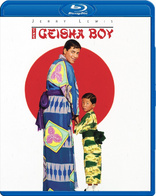
Movie rating
6.6 | / 10 |
Blu-ray rating
| Users | 4.5 | |
| Reviewer | 3.5 | |
| Overall | 3.5 |
Overview
The Geisha Boy (1958)
Gilbert Wooley is a second-rate magician who is sent to entertain the troops in the pacific. During his time in Japan he becomes attached to a little orphan boy.
Starring: Jerry Lewis, Suzanne Pleshette, Sessue HayakawaDirector: Frank Tashlin
| Comedy | 100% |
Specifications
Video
Video codec: MPEG-4 AVC
Video resolution: 1080p
Aspect ratio: 1.78:1
Original aspect ratio: 1.85:1
Audio
English: DTS-HD Master Audio Mono
Subtitles
None
Discs
25GB Blu-ray Disc
Single disc (1 BD)
Playback
Region A, B (C untested)
Review
Rating summary
| Movie | 3.5 | |
| Video | 3.5 | |
| Audio | 3.5 | |
| Extras | 0.0 | |
| Overall | 3.5 |
The Geisha Boy Blu-ray Movie Review
Jerry in Japan.
Reviewed by Jeffrey Kauffman February 23, 2012Probably one of the more politically incorrect characters in Jerry Lewis’ arsenal of wacky personas is his buck-toothed Asian man, who pops up in various guises in several Lewis vehicles. This falls into the same at least somewhat (and perhaps even highly) objectionable style of portrayal that got Mickey Rooney into so much hot water in Breakfast at Tiffany’s, but it was part and parcel of what was accepted in the “olden days” of mid-twentieth century entertainment (and of course, long before that). It may come as something of a surprise, then, how gentle and measured Lewis’ approach to Japanese culture is in The Geisha Boy, the second of his two 1958 Frank Tashlin collaborations (after the also recently released Rock- A-Bye Baby). As with a lot of the Lewis-Tashlin films, we’re offered a sort of schizophrenic approach that lurches between shtick-filled gags and heartstring pulling moments that feature Jerry’s softer, gentler side. Whatever one might say about Lewis’ manic comedic personality (and let’s face, just about everything has been said about Lewis in his long and legendary career), he almost always showed a sweet, endearing side in a lot of his films, even if that side verged on the cloying more often than not. The Geisha Boy follows the already well established formula of having Jerry creating pandemonium just about everywhere he goes, with interstitials allowing a little “breathing room” which offer Jerry acting more like a sane human being, in this case mostly with an adorable little Japanese boy who develops an attachment to Jerry’s character of a visiting (third-rate) magician with a USO touring show.
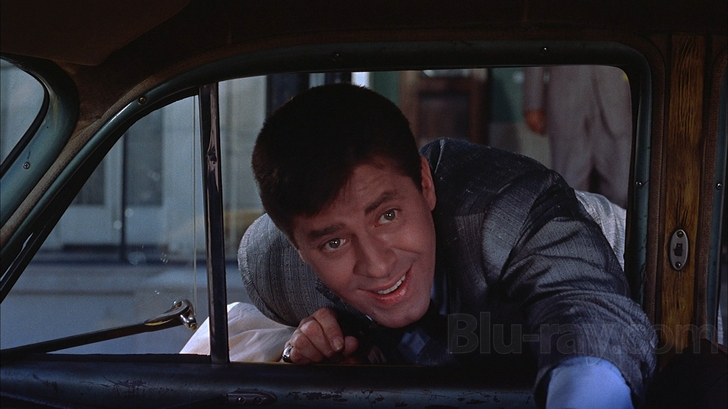
Jerry’s sad sack persona is transferred to the low-fi world of touring magicians as he portrays Gilbert Wooley, a down on his luck prestidigitator who has signed up for a USO tour because he can’t find work stateside. The headliner of the tour is glamorous movie star Lola Livingston (Marie McDonald), who takes an instant dislike to Gilbert when the presence of Gilbert’s hidden pet rabbit upsets her pet dog, leading to the military attaché telling the star she can’t bring the little pup along. Gilbert of course panics, and attempts to keep “Harry the Hare”’s presence secret from everyone, though his penchant for asking for carrot salads at every on-flight meal raises the suspicion of a comely Sergeant (Suzanne Pleshette in her film debut) who acts as liaison between the military and the performers. Harry in fact has a number of great gags throughout the film, including a very funny slide down a huge banister in Japan in one of the film’s more frenetic set pieces.
Gilbert and Lola continue mixing like oil and water, as might be expected, leading to more quasi-hilarity on the plane, especially once Harry escapes from his cage and wreaks a good deal of havoc. There is one admittedly funny sequence here where Harry gets ensconced in Lola’s sleeper suite, which is capped with a great sight gag. This segment also helps to develop the nascent romance between Gilbert and Pleshette’s Sergeant Pearson.
Once the film gets to Japan, the simmering tensions between Gilbert and Lola positively erupt on the tarmac which leads the major plot arc of the entire film. A young Japanese boy is in attendance, having been brought there by his Aunt, the military’s translator. It turns out that the boy, Mitsuo (Robert Hirano), is an orphan who hasn’t smiled since the death of his parents. Seeing the bedlam caused by Gilbert as he more or less destroys Lola’s “big entrance” actually doesn’t just make Mitsuo smile, it makes him laugh out loud. The boy’s Aunt, touched by this sight, brings the boy to Gilbert’s hotel so that they can both thank him. It turns out that Mitsuo is indulging in a bit of hero worship and wants Gilbert to be his father. Gilbert, not exactly a likely candidate for hero worship, is touched, but doesn’t quite know how to respond.
The rest of the film lurches somewhat uneasily between huge set pieces with some excellent sight gags and the sort of cloying sentimentality that seemed to be a Lewis stock in trade. Gilbert and Mitsuo make a sort of father and son odd couple , especially after Gilbert, convinced that he’s an abject failure, decides to sneak out of Japan so that he doesn’t devastate Mitsuo. Mitsuo has ideas of his own, though, and stows away on the flight back to America. That sets up one of the film’s big cameo segments featuring the 1958 Los Angeles Dodgers. On the flip side, the Japanese sequences feature a rather odd, if undeniably funny, cameo by Sessue Hayakawa as Mitsuo’s grandfather. Hayakawa, then just coming off of his Best Supporting Actor Academy Award nomination for The Bridge on the River Kwai plays a man obsessed with. . .well, the Bridge on the River Kwai. It’s a patently odd little addition to this otherwise pretty standard, sweet natured film. (It’s a little ironic to consider that Hayakawa lost the Oscar to Red Buttons, who won for Sayonara, another film that was set in Japan.)
The Geisha Boy was released during the Christmas holiday season of 1958 and that was probably no mere coincidence. The film focuses on a “found family” and is the sort of unabashedly nostalgic entertainment that speaks to hearth and home. While Jerry is typically manic, at least in a couple of key sequences, he’s also surprisingly low key in a lot of the interactions with the little Japanese boy. People tend to remember only the frantic side of Lewis, but the fact is an objective view of his solo film heyday reveals a rather charming side to his persona that always tended to be sweet, good hearted and kind, especially to kids (and animals). The Geisha Boy is a relatively artful blend of both extremes of the Lewis pantheon. Lewis obviously eschewed W.C. Fields’ advice about playing in films with children and animals, but in this case at least, no one comes out worse for the wear.
The Geisha Boy Blu-ray Movie, Video Quality 
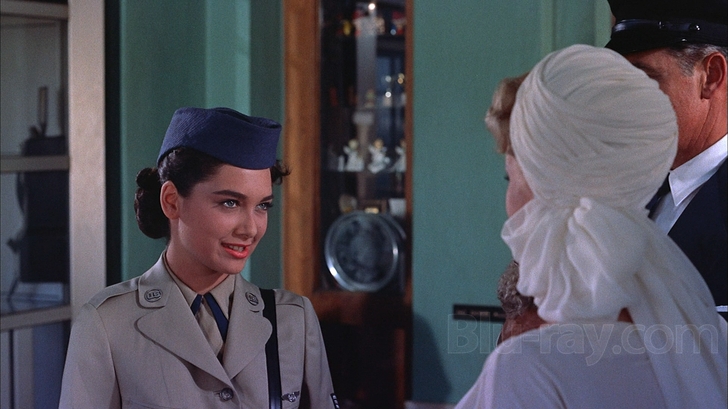
The Geisha Boy is presented on Blu-ray courtesy of Olive Films with an AVC encoded 1080p transfer in 1.78:1. As with the other Lewis Paramount features being released en masse by Olive, The Geisha Boy boasts a generally sharp and appealing looking transfer that offers excellent saturated colors, decent sharpness and clarity and overall pleasing fine detail. Flesh tones occasionally seem to be just slightly on the cyan side of things, perhaps a sign of age related fade. Olive releases never exhibit any signs of digital tweaking, and so both grain as well as damage remain entirely intact. This film features a bit more softness and damage than usual due to some stock and second unit shots, which don't quite match the sharpness and clarity of the studio bound sequences (see screenshot 14 of the train for a particularly egregious example).
The Geisha Boy Blu-ray Movie, Audio Quality 
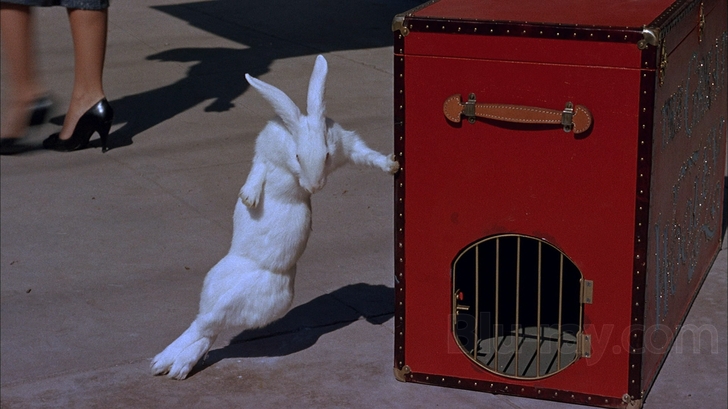
The Geisha Boy features a lossless DTS-HD Master Audio 1.0 mix which more than adequately reproduces the film's fairly unambitious sonic design. Dialogue and effects are very well presented and prioritized, and Walter Scharf's colorful score also sounds just fine. The track exhibits very little age related wear and tear, and aside from some minor hiss, there's little here to complain about, even if there's similarly little to get really excited about.
The Geisha Boy Blu-ray Movie, Special Features and Extras 
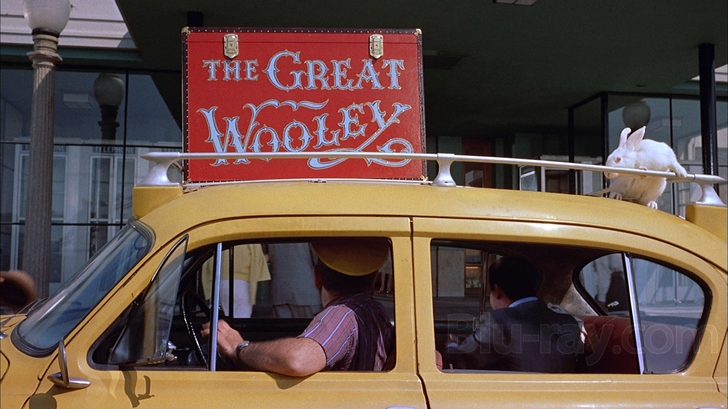
The Geisha Boy is on the lachrymose and saccharin side of things, but it still manages to deliver some hefty laughs along the way. This isn't the gagfest that a lot of the Tashlin-Lewis collaborations are, but the Tashlin penchant for weird little visual jokes is well on display and some of the physical humor is very funny as well. What's notable about this film is its kinder, gentler side, which may drive some people crazy, but which is probably the film's strongest element. Lewis and little Hirano interact beautifully, and the film also offers some good moments for Suzanne Pleshette in her first role. It's bright, colorful and only occasionally crazy, but The Geisha Boy actually holds up surprisingly well. This Blu-ray looks and sounds fine, and despite the typical Olive Films lack of any supplements, this release comes Recommended.
Similar titles
Similar titles you might also like

The Open Road
2009

Woman of the Year
1942

Much Ado About Nothing
2012

Woman in Gold
2015

Fading Gigolo
2013

Carbon Copy
1981

Room for One More
Warner Archive Collection
1952

Big Trouble
1986

The Good Fairy
1935

The Thrill of It All!
1963

The Prince and the Showgirl
Warner Archive Collection
1957

Not Suitable for Children
2012

That Touch of Mink
1962

My Favorite Blonde
1942

Thanks for Sharing
2012

Afternoon Delight
2013

It Started in Naples
1960

Friends with Money
2006

The Ugly Truth
2009

The Weather Man
2005